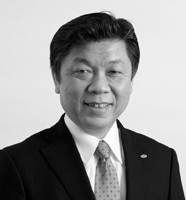Announcement
Collapse
No announcement yet.
An interesting read about the E-M1
Collapse
X
-
Tags: None
-
Re: An interesting read about the E-M1
very interesting and for a Japanese engineer I thought that Eiji Shirota was very direct and positive (having spent more than 10 years in the past working with and training some it was very refreshing and showed how much confidence he has in what they are doing with the focusing system in particular)
this and this
in particular I found most interesting as its conventional wisdom from the DSLR technology that faster lenses focus quicker and more accurately, which, I think, he says is not the case with their system?DE: So with the on-chip PD, you are able to vary that separation depending on the aperture. So with a very large aperture, you can use a large separation?DE: So the separation is constant regardless of the lens aperture?
-
Re: An interesting read about the E-M1
Thanks for the link.
They lost me here. Can we have that in english please?DE: One of the characteristics of phase detect autofocus is the base line, the separation between the two sets of sensors. With a conventional separate phase detect sensor, you have a fixed baseline. With PD on the imaging sensor, that restriction should go away . On the M1, when you have a very wide aperture lens, can any of the AF locations have a longer baseline?
Shirota: For on-chip phase detection, the separation distance issue has been overcome.Most used: EM5i + 12-200mm, In briefcase: E-PM2 + 12-42mmEZ
Film Kit OM4Ti + Vivitar Series 1 (OM fit ) 28-105mm F/2.8-3.8, Sigma III (OM fit) 75-200mm F/2.8-3.5, Vivitar Series 1 (OM fit) 100-500mm, Zuiko 50mm F/1.2
Learn something new every day
Comment
-
Re: An interesting read about the E-M1
On the E-M1, there's just one sensor, so the focus sensing and imaging are at the exact same distance from the lens. On an SLR, the focusing is usually done when the mirror is reflecting into the viewfinder and some of that light is split and used for the autofocus sensor. These complications make it challenging to have the autofocus sensor at the exact same distance (and angle) as the imaging sensor, resulting in focusing offsets. The lens might be correctly focused for the focusing sensor, but not for the imaging sensor.
Comment
-
Re: An interesting read about the E-M1
Thanks for responding. I knew this but didn't realise this is what they were talking about because of this bit:Originally posted by jmunkki View PostOn the E-M1, there's just one sensor, so the focus sensing and imaging are at the exact same distance from the lens. On an SLR, the focusing is usually done when the mirror is reflecting into the viewfinder and some of that light is split and used for the autofocus sensor. These complications make it challenging to have the autofocus sensor at the exact same distance (and angle) as the imaging sensor, resulting in focusing offsets. The lens might be correctly focused for the focusing sensor, but not for the imaging sensor.
You get a longer optical path if you are measuring the light from the edge of the lens to the PD sensor (either seperate or on the imaging sensor) than you do from nearer to the centre of the lens, the longer the optical path the easier it is to detect a phase difference, so a wide aperture lens can help. The "seperation distance" in the answer is surely, as you say, referring to the imaging sensor to lens distance and phase detect sensor to lens distance being the same when using imaging sensor PD. This is either not answering the question, or me not understanding the question. Both are possible.On the M1, when you have a very wide aperture lens, can any of the AF locations have a longer baseline?
Shirota: For on-chip phase detection, the separation distance issue has been overcome.Most used: EM5i + 12-200mm, In briefcase: E-PM2 + 12-42mmEZ
Film Kit OM4Ti + Vivitar Series 1 (OM fit ) 28-105mm F/2.8-3.8, Sigma III (OM fit) 75-200mm F/2.8-3.5, Vivitar Series 1 (OM fit) 100-500mm, Zuiko 50mm F/1.2
Learn something new every day
Comment
-
Re: An interesting read about the E-M1
I met Shirota san in Tokyo back in August along with several of his colleagues. Interviews to be published soon on FTU!Originally posted by brian1208 View Postvery interesting and for a Japanese engineer I thought that Eiji Shirota was very direct and positive (having spent more than 10 years in the past working with and training some it was very refreshing and showed how much confidence he has in what they are doing with the focusing system in particular)
this
and this
in particular I found most interesting as its conventional wisdom from the DSLR technology that faster lenses focus quicker and more accurately, which, I think, he says is not the case with their system?
IanLast edited by Ian; 6 November 2013, 07:56 PM.Founder and editor of:
Olympus UK E-System User Group (https://www.e-group.uk.net)
Comment
-
Re: An interesting read about the E-M1
The questions on aperture regarding base-line PD-AF are the dumb bits : the answers are clear.Originally posted by OM USer View PostThey lost me here. Can we have that in english please?
Ignore the question, understand the answer.
He is answering NO, but he is Japanese : therefore cannot say no.
Comment

Comment